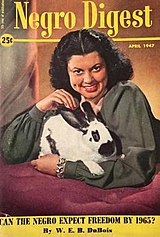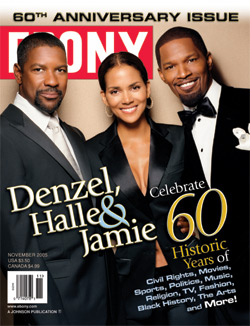
Ebony is a monthly magazine that focuses on news, culture, and entertainment. Its target audience is the African-American community, and its coverage includes the lifestyles and accomplishments of influential black people, fashion, beauty, and politics.
James Wheaton, was an American motion picture, stage, and television actor. Wheaton's credits include THX 1138, Trouble Comes to Town and Sanford and Son.

The Black Arts Movement (BAM) was an African American-led art movement that was active during the 1960s and 1970s. Through activism and art, BAM created new cultural institutions and conveyed a message of black pride. The movement expanded from the incredible accomplishments of artists of the Harlem Renaissance.
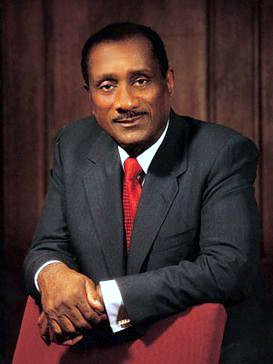
John Harold Johnson was an American businessman and publisher. Johnson was the founder in 1942 of the Johnson Publishing Company, headquartered in Chicago, Illinois. Johnson's company, with its Ebony (1945) and Jet (1951) magazines, was among the most influential African-American business in media in the second half of the twentieth century. In 1982, Johnson became the first African American to appear on the Forbes 400. In 1987, Johnson was named Black Enterprise Entrepreneur of the year. in 1996, he was awarded the Presidential Medal of Freedom.
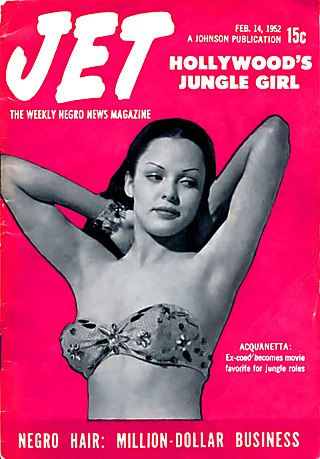
Jet is an American weekly digital magazine focusing on news, culture, and entertainment related to the African-American community. Founded in November 1951 by John H. Johnson of the Johnson Publishing Company in Chicago, Illinois, the magazine was billed as "The Weekly Negro News Magazine". Jet chronicled the civil rights movement from its earliest years, including the murder of Emmett Till, the Montgomery bus boycott, and the activities of civil rights leader Martin Luther King Jr.

Era Bell Thompson was an American writer and editor.

Johnson Publishing Company, Inc. (JPC) was an American publishing company founded in November 1942 by African-American businessman John H. Johnson. It was headquartered in Chicago, Illinois. JPC was privately held and run by Johnson until his death in 2005. His publications "forever changed the popular representation of African Americans." The writing portrayed African Americans as they saw themselves and its photojournalism made history. Led by its flagship publication, Ebony, Johnson Publishing was at one time the largest African-American-owned publishing firm in the United States. JPC also published Jet, a weekly news magazine, from November 1951 until June 2014, when it became digital only. In the 1980s, the company branched into film and television.

Lerone Bennett Jr. was an African-American scholar, author and social historian who analyzed race relations in the United States. His works included Before the Mayflower (1962) and Forced into Glory (2000), a book about U.S. President Abraham Lincoln.
Anita Cornwell was an American lesbian feminist author. In 1983, she wrote the first collection of essays by an African-American lesbian, Black Lesbian in White America.

John Oliver Killens was an American fiction writer from Georgia. His novels featured elements of African-American life. In his debut novel, Youngblood (1954), Killens coined the phrase "kicking ass and taking names". He also wrote plays, short stories and essays, and published articles in a range of outlets.
Dan Burley was an American pianist and journalist. He appeared on numerous network television and radio shows in the US and had two radio shows of his own on WWRL Radio in New York.
Angela Jackson is an American poet, playwright, and novelist based in Chicago, Illinois. Jackson has been a member of the Organization of Black American Culture (OBAC), a community that fosters the intellectual development of Black creators, since 1970. She has held teaching positions at Kennedy-King College, Columbia College Chicago, Framingham State University, and Howard University. Jackson has won numerous awards, including the American Book Award, and became the fifth Illinois Poet Laureate in 2020.

Eunice Walker Johnson was an American businesswoman. Johnson was the wife of publisher John H. Johnson and an executive at Johnson Publishing Company. Johnson was the founder and director of the Ebony Fashion Fair, which began in 1958 as a hospital fundraiser and became an annual worldwide fashion tour that highlighted fashion for African-American women, running until a year before her death.
Hoyt W. Fuller was an American editor, educator, critic, and author during the Black Arts Movement. Fuller created the Organization of Black American Culture in Chicago. In addition, he taught creative writing and African-American literature at Columbia College Chicago, Northwestern University, and Cornell University.

Margaret Danner (1915–1984) was an American poet, editor and cultural activist known for her poetic imagery and her celebration of African heritage and cultural forms.
The Organization of Black American Culture (OBA-C) was conceived during the era of the Civil Rights Movement by Hoyt W. Fuller as a collective of African-American writers, artists, historians, educators, intellectuals, community activists, and others. The group was originally known as Committee for the Arts (CFA), which formed in February 1967 in Southside Chicago, Illinois. By May 1967, the group became OBAC and included Black intellectuals Hoyt W. Fuller, the poet Conrad Kent Rivers, and Gerald McWorter. OBAC aimed to coordinate artistic support in the struggle for freedom, justice and equality of opportunity for African Americans. The organization had workshops for visual arts, drama, and writing, and produced two publications: a newsletter, Cumbaya, and the magazine Nommo.
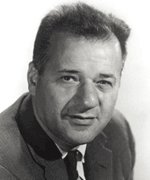
Ben Burns was an American pioneering editor of black publications and a public relations executive in Chicago. He was a “top executive editor” for the Johnson Publishing Company who became so well known as a “black newspaperman” – even though he was Jewish – that he was invited to submit his biography for inclusion in Who's Who in Colored America.

Rosey E. Pool was a Dutch poet and anthologist of African-American poetry.

Freedom was a monthly newspaper focused on African-American issues published from 1950 to 1955. The publication was associated primarily with the internationally renowned singer, actor and then officially disfavored activist Paul Robeson, whose column, with his photograph, ran on most of its front pages. Freedom's motto was: "Where one is enslaved, all are in chains!" The newspaper has been described as "the most visible African American Left cultural institution during the early 1950s." In another characterization, "Freedom paper was basically an attempt by a small group of black activists, most of them Communists, to provide Robeson with a base in Harlem and a means of reaching his public... The paper offered more coverage of the labor movement than nearly any other publication, particularly of the left-led unions that were expelled from the CIO in the late 1940s... [It] encouraged its African American readership to identify its struggles with anti-colonial movements in Africa, Asia, and the Caribbean. Freedom gave extensive publicity to... the struggle against apartheid."
Herbert Temple Jr. was an American art director and illustrator. He worked for Johnson Publishing Company in Chicago for 54 years, first as an illustrator hired in 1953, and then art director starting in 1967.
